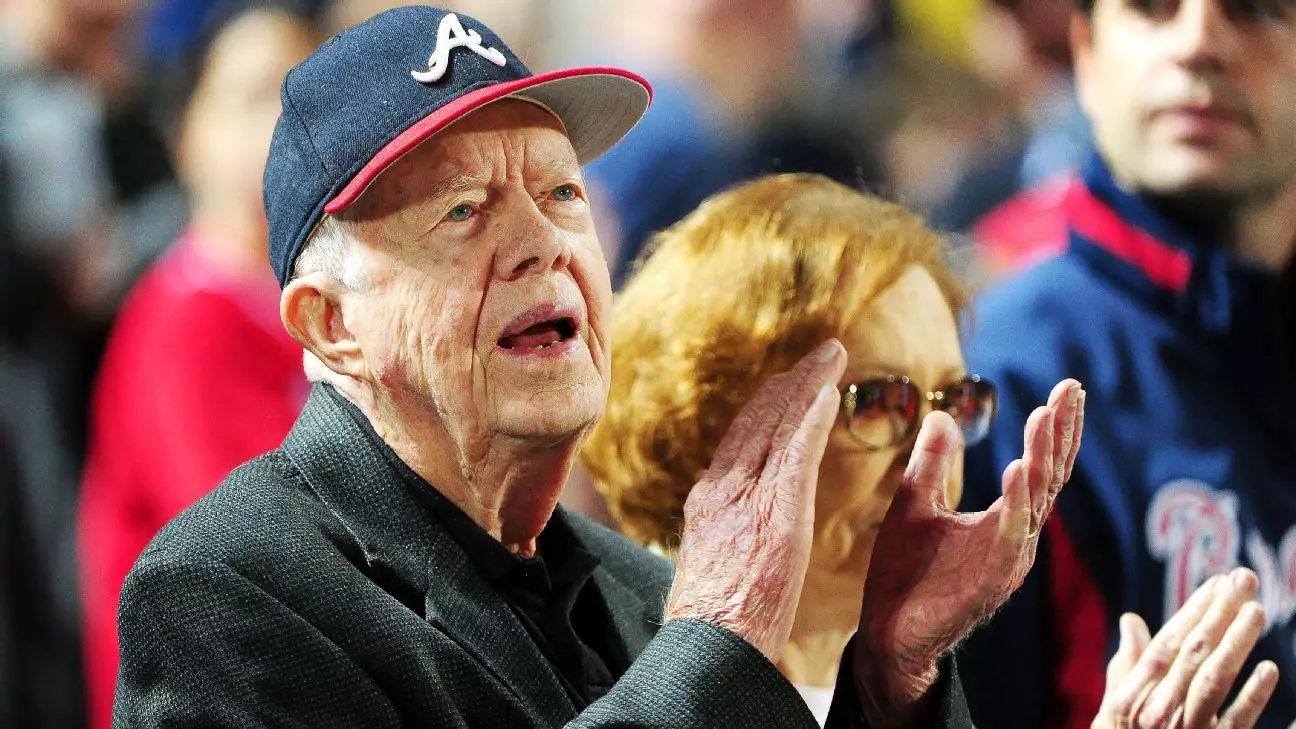On a solemn Sunday afternoon, the world bid farewell to a beacon of compassion and resilience, former President Jimmy Carter. As confirmed by The Carter Center, he passed away peacefully at his home in Plains, Georgia, at the remarkable age of 100. This notable milestone not only establishes Carter as the longest-living U.S. president in history but also serves as a profound testament to a life dedicated to public service, humanitarian efforts, and an unwavering commitment to democracy.
Carter’s life was characterized by a myriad of roles beyond the presidency. Known affectionately as „Jimmy,“ he was not merely a political figure; he was a devoted family man, a sports enthusiast, and a humanitarian. His love for the Atlanta Braves reflected his grassroots connections and his deep appreciation for American culture. Indeed, Carter’s presidency was marked by significant events that shaped both domestic and foreign policy.
The Carter presidency was not without its challenges. Among the pivotal moments was the decision to boycott the 1980 Moscow Olympics in protest of the Soviet invasion of Afghanistan. This act of solidarity with the Afghan people became a defining moment of his administration. With more than 60 nations joining the boycott—including major players like West Germany, Japan, and China—it left a lasting impact on international sports.
In his own reflections, Carter expressed the burdens of leadership, describing the Olympic boycott as one of his hardest choices. This complexity is further echoed in his presidential memoir, „Keeping Faith,“ where he spoke on the implications that such a decision had politically and personally, emphasizing that for the Soviet Union, the Olympics symbolized much more than athletic competition. This frustration with geopolitical conflicts highlighted a key theme of his presidency: the fusion of policy with personal conscience.
The aftermath of the decision led to a retaliatory Soviet boycott of the 1984 Los Angeles Olympics, showcasing how interconnected politics and sports can be. With a firm grasp on history, Carter noted the Soviet perspective and positioned his choices within the broader context of global relations at that time. This level of analysis demonstrates his lifelong commitment to understanding and navigating complex global issues.
Carter’s legacy extends well beyond his presidency, characterized by his relentless advocacy for human rights, democracy, and disease prevention through The Carter Center. Founded in 1982, this nonprofit organization has made remarkable strides in global health and conflict resolution. His commitment did not go unnoticed, earning him the Nobel Peace Prize in 2002, a hallmark of his life’s work that resonates with countless individuals across the world.
Outside of politics, his partnership with Habitat for Humanity and engagement in building homes showcased a man who put action behind his words—literally helping to construct a better future for those in need. During his post-presidency years, he embodied service through humility, further reinforcing his dedication to the ethos of community and support for others.
Carter’s ties to his Georgia roots remained strong throughout his life. His presence at Braves games, including noteworthy appearances on the jumbotron, reinforced his down-to-earth persona. He was often seen enjoying the games with Rosalynn, his partner-in-life for over 77 years. This genuine love story further humanizes his public image, illustrating a commitment to family and companionship that transcended the political sphere.
Despite a cancer diagnosis in 2015, which he remarkably overcame, it was the decision to enter hospice care in February 2023 that signaled his acceptance of life’s temporal nature. The choice to spend his remaining days at home with his family epitomizes the values he cherished most—dignity, love, and connection. Surrounded by loved ones, Carter embraced the inevitable with grace, continuing to teach through his actions even in his final days.
Through his enduring legacy of public service and humanitarian ideals, Jimmy Carter leaves an indelible mark on both America and the world. His life story is one of tenacity, compassion, and unwavering commitment to seeking peace and fostering understanding. The impact of his work and his spirit will undoubtedly resonate for generations to come, reminding us all of the power of kindness and the importance of serving others. In the narrative of an illustrious 100 years, Carter’s life ultimately serves as a guiding light, illustrating the profound influence one individual can have on the world.


Napsat komentář